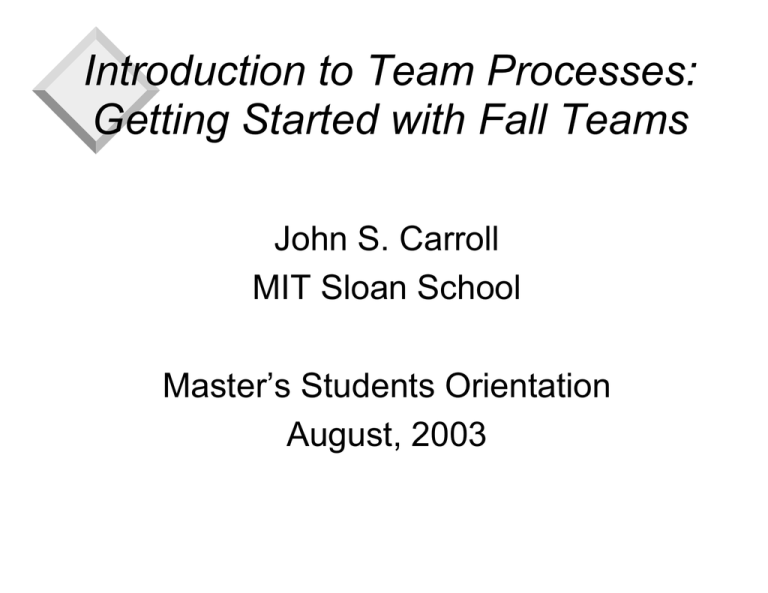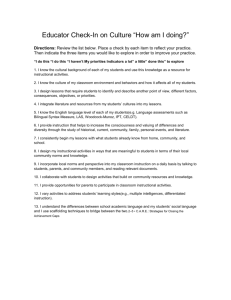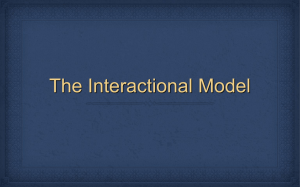Document 13627741
advertisement

Introduction to Team Processes: Getting Started with Fall Teams John S. Carroll MIT Sloan School Master’s Students Orientation August, 2003 More and More Teams Last year, how many teams were you on? Business is increasingly team-based as departments and hierarchies yield to projects and networks. Flexibility requires expertise where the work is done. At Sloan, you will be on a Fall Core team, project teams, clubs, committees... Teams leverage varied expertise, motivate performance, offer learning opportunities, give emotional support... Team Effectiveness How many of you were on a team that did really well? Do you know why? Any teams that messed up? In terms of: – Performance goals (quality, quantity, timeliness, efficiency, innovation) – Member satisfaction (meet individual needs, maintain trust) – Team learning (skills, perspectives, behaviors) – Customer satisfaction (external stakeholders) Teams Develop Over Time productivity happiness workload time orientation mid-terms projects finals Team Challenges Changes such as starting up, adding a new person, or beginning a project challenge a team to grow We can simplify team development into stages or challenges that may be experienced many times Forming: Who are we? Who leads? Who cares? Storming: We are different. We disagree. Norming: We set goals, assign tasks, develop routines, manage conflict, hold each other accountable Performing: We coordinate, trust each other, care Renewing/Disbanding: We learn, revisit our goals, thank each other, say goodbye Team Processes Communicating Managing conflict Decision making Leading Influencing Negotiating Innovating Motivating Planning and goal setting Rule making Rewarding and sanctioning Getting resources Dealing with “customers” Team Performance Curve performance high-performing team team working group team effectiveness Team Building Next Steps Spend some time with your Core Team – Unstructured time to get to know each other – Scavenger Hunt – Teambuilding at the Warren Center Organize for Core courses – Team projects (each course is different) – OP Team Project (15.328) – First Year Challenge Starting Up Begin to get to know each other Set goals and norms for (you and) the team A simple “check-in” can help make meetings more effective. For example, give: – Your name (until everyone learns names) – Something you do that someone else thinks is amazing – How you are feeling right now; hopes, fears – Close with “I’m in” and let the next person speak – Check-in topics can be general or focused – A “check-out” can build learning and mobilize work Goals For Your Team What goals do you want to achieve in your Core team? Take two minutes individually to write your personal goals Share goals Prioritize the goals as a team – try multivoting, e.g., 2 or 3 votes per person – consider what happens at “crunch” time! Revisit the goals as the semester progresses Norms For Your Team How do you want to work together? What is desired? What is unacceptable? Take a few minutes individually to write down some norms about meetings, work standards, communication, leadership, conflict, consideration, etc. Fill out the questionnaire on “good” teams Share answers and begin thinking about how you will work together What Makes a “Good” Team? There is competitiveness among members............... Everyone sticks closely to the point........................ The team avoids conflict situations......................... Members rotate leadership functions....................... Each member gives & receives feedback on feelings. A detailed plan is suggested for each meeting.......... Aggression is openly expressed.............................. Informal subgroups develop spontaneously.............. Members freely express negative feelings................ The overall goals of the team are explicitly stated..... Information is freely shared among members............ Members’ feelings are considered when tasks are..... performed Mostly yes ____ ____ ____ ____ ____ ____ ____ ____ ____ ____ ____ ____ Mostly no ____ ____ ____ ____ ____ ____ ____ ____ ____ ____ ____ ____ Team and Individual Work It can be confusing to draw the line between individual work and team work Honesty is key: you may not claim others’ work to be your own! Classes give individual assignments and yet teams share results; classes differ somewhat Make sure your instructor is clear on what is expected regarding individual work Some national cultures consider copying others’ work to be normal; people differ Make sure your team is clear on the boundaries between helping each other learn and cheating Tips For Your Teams If you don’t know where you are heading, it doesn’t matter which road you take Skills for giving and receiving feedback are essential. Also conflict management, trust building, and boundary management. A little structure goes a long way (agenda, roles) Processes (norms, procedures) matter Don’t be afraid to ask for help; this is the most supportive learning environment around Resources For Your Teams Team Handbook in 15.311 OP/15.328 Team Project (and other material in OP, Communications,...) Team Cards as signals and reminders Pilots, TAs, and second-year “experts” Advisors (faculty, SAO, CDO, family, friends) Take risks; try things you are not good at; make mistakes (mistakes are not failures); cherish feedback Teamwork =not allowing teammates to fail




